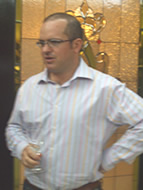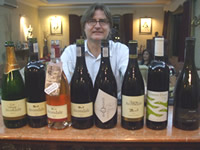|
Looking at the picture poster of harvesting at Avondale vineyards would make many buyers, journalists and wine lovers to want to go to Paarl in the Cape Province, South Africa to better understand the process of making bio-logic and organic wines. If the bio-logic wine also includes beautiful women in raw plucking each grape with loving care, it might be worth a visit to the vineyard to get a good grasp.
But talk to Johnathan Grieve whose family owns it through a trust, who pioneered the back-to-the-future approach to viticulture, he will tell you all about the natural fungi, bacteria and larger organisms being put back into the soil in order to restore it to its natural, pre-agriculture state and treating the vines as indigenous plants which deliver the essence of the soil into ripe grapes and eventually wines.
In what he terms ‘Bio-Logic’ (different than bio-dynamic) ‘we farm in accordance with organic principles or adhere to the bio-friendly way of natural farming. It means restoring the natural balance of the soil so that vines can be fed and balanced by lively, healthy and naturally regenerating soils.’
This in essence is the sustainable farming. He believes this is the only sustainable way for future success and to make real wines. Avondale is a certified producer of organic grapes by the international organic accreditation authority, and was one of the first Cape wine producers to do so.
Since 1999 when they went bio-logic, Avondale has excelled in the South African and international wine competitions, consistently picking up four star ratings, double gold, gold and silver medals in The Platter Guide, Veritas, Michelangelo competitions and ratings in South Africa.
‘There has been a lot of concern about the South African wine industry for its ever increasing alcohol levels. The problem may be resolved by certified organic wineries like Avondale in Paarl, which use organic, bio-LOGIC processes that help maintain the balance in the vineyards and keep the alcohol levels down’, says Cathy Van Zyl, MW a journalist, write and the associate editor for the Platter Guide.
 |
| Johnathan Grieve |
I had visited Jonathan’s vineyard last year with Cathy and was impressed by the vines and the resulting wines. It is not their sole objective to reduce the alcohol level. ‘Our objective is to achieving balance in the vineyard. We achieve this by constantly feeding the vineyards with natural elements, rather than synthetic fertilizers. A complete cover crop system is in place to generate nitrogen and to create a living system in which organism and micro-organisms can flourish,’ he said.
Along with several other natural methods, Avondale uses sea salt which contains 90 natural elements, according to what John told us. By preparing samples of sea water to a point where all the elements are present in perfect balance, it creates the perfect nutrient source.
‘Once the system is in balance, the vine will control its own nutrient sources. When the vine needs nitrogen for growth, it will secrete basic sugars on its roots. This is food for a certain group of fungi and bacteria, which then produce the nitrogen the vine needs.’
He further explained that ‘when the vine needs to set its fruit, and when veraison occurs, the vine needs potassium, not nitrogen. It will then secrete a different food source that attracts a different micro flora, which provides the potassium.’
The Tasty Dozen
 |
| Krige Visser |
Proof of a fine wine is in the glass. So we got down to the business of tasting of 12 wines which were presented by Krige Visser, the marketing manager for Avondale, who was accompanying him. Starting with Avondale Brut which is made from organically grown Chardonnay and using the Methode Cap Classique (MCC is the term used by South Africa for traditional champagne type double fermentation) had the flavour of lime and apples with a touch of biscuits and nice and long bubbles.
This was followed by the Chenin Blanc, the signature South African white grape which has given a much more elegant and crisp wine than we have been able to manage in India. It has citric aromas with ripe fruit flavours and a touch of honey. With a residual sugar of only 3 gms/liter (the Indian version goes to 15-20 gms), the tangy fruits lingered on the palate for a long time. This was followed by Sauvignon Blanc and Green Duck which is a blend of undisclosed grapes and can be aged for 5 years. One agreed with Krige that you don’t drink just a bottle of it, you’d ask for more because of its fresh and crisp acidity and balance.
We went through a plethora of red wines. Julia, the wine with Bordeaux blend was an instant winner- a fine Bordeaux at fraction of the price would suffice to describe the wine named after Jonathan’s grand mother. Camissa Syrah with ripe and juicy tannins was spicy enough with a flavour of dark chocolates that coated your palate. There was also the regular varietal Syrah to taste.
The piece de resistance was Les Pleurs- basically a Syrah but with 10% Mourvedre; South Africans are as much enamoured with Rhone as with Bordeaux. The decanted wine had a smooth silky texture in the mouth, elegant and well balanced. The ripe tannins make it a serious food wine, though the slight peppery flavour would make it a meditation wine as well-the kind you can sip and enjoy with friends.
Between the whites and the reds, Krige had also slipped in the dry Rose made from 80% Muscat and 20% Mourvedre. This could be singled out as one of the finest Rose one has tasted. It went so well with the succulent and melting shammi kebabs that were soft and juicy, and the slight tannic component due to Mourvedre handled the meat protein well whereas the fruity Muscat balanced the spices in them.
It would be difficult to single out a wine that one would not want to repeat- fine wines them all. Some were for daily drinking others like Les Pleurs, for special occasions, because surely there would be the commensurate price tags on them. With heavy taxation, it boils down to pricing at the end of the day and the tastings may not result in the sale at the counter.
Incidentally, in case Rocky’s foodie fans are wondering, he decided to add wine imports to his business portfolio and is considering import of these wines.
Subhash Arora |